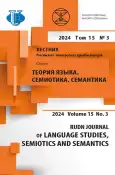Proper Names in English Humorous Discourse: at the Crossroads of Fundamental Theories and Entertainment
- Autores: Kosichenko E.F.1
-
Afiliações:
- National Research University «Moscow Power Engineering Institute»
- Edição: Volume 15, Nº 3 (2024)
- Páginas: 755-770
- Seção: DISCURSIVE LINGUISTICS
- URL: https://journal-vniispk.ru/2313-2299/article/view/323584
- DOI: https://doi.org/10.22363/2313-2299-2024-15-3-755-770
- EDN: https://elibrary.ru/GUOFXO
- ID: 323584
Citar
Texto integral
Resumo
The aim is to reveal the role of personal names in creating comic effect in different types of humorous discourse. A special focus is placed on J.S. Mill’s, A. Gardiner’s, B. Russel’s theories of proper names. Emphasis is also laid on the contribution of H. Spencer, Ch. Darwin, B. Jonson and W. Shakespeare to the development of the general theory of humour. The basic research methods are semiotic, linguo-stylistic and etymological analysis, data interpretation, website traffic analysis. Theoretical works by British philosophers, scientists and writers can be used as a methodological foundation for studying personal names in humorous discourse. Analysis of English onomastic jokes, puzzles, articles from British magazines and internet-memes proves the pervasive nature of onomastic humour in English. The author hypothesizes that the interest of the most outstanding British thinkers taken in personal names and humour are hardly accidental and can be explained by the uniqueness of British culture and national identity.
Palavras-chave
Sobre autores
Elena Kosichenko
National Research University «Moscow Power Engineering Institute»
Autor responsável pela correspondência
Email: KosichenkoYF@mpei.ru
ORCID ID: 0000-0001-7613-9744
Código SPIN: 6010-5223
Researcher ID: HKW-0823-2023
Dr.Sc. (Philology), Associate Professor, Department of Advertising, Public Relations and Linguistics
14, b.1, Krasnokazarmennaya str., Moscow, Russian Federation, 111250Bibliografia
- Plato. (1999). Cratylus. https://www.gutenberg.org/files/1616/1616-h/1616-h.htm (accessed: 18.03.2024).
- Aristotle. (2004). Rhetoric. Transl. by W. Rhys Roberts. Courier Corporation. URL: https://classics.mit.edu/Aristotle/rhetoric.mb.txt (accessed: 18.03.2024).
- Cicero, M.T. (2001). On the ideal Orator (de Oratore). London: Oxford University press.
- Plutarch. (1990). Table Conversations. Leningrad: Nauka. (In Russ.).
- Kant, I. (1987). Critique of judgment. Indianapolis; Cambridge: Hackett Publishing Company.
- Schopenhauer, A. (1992). The World as Will. In: A collection of works. Vol. 1. URL: http://az.lib.ru/s/shopengauer_a/text_0040.shtml (accessed: 18.03.2024).
- Mill, J.S. (1882). A system of Logic, Ratiocinative and Inductive: Being a Connected View of the Principles of Evidence, and the Methods of Scientific Investigation. London: Cambridge University Press.
- Russell, В. (1920). Descriptions. Introduction to Mathematical Philosophy. Ch. XVI. URL: https://www.fitelson.org/proseminar/russell_descriptions.pdf (accessed: 18.03.2024).
- Joseph, H.W.B. (1916). An Introduction to Logic. Oxford: At the Clarendon Press.
- Gardiner, A.H. (1954). The Theory of Proper Names. A Controversial Essay. Oxford: Oxford University Press.
- Hobbes, T. (1650). On Laughter, Wit and Power. On Human Nature. URL: https://cuny.manifoldapp.org/read/untitled-71c25fb1-d3a9-4b0f-bcfb-a7041d5aadb1/section/052b69cfcf6f-4350-a328-ea40ac8b2608 (accessed: 18.03.2024).
- Spencer, H. (1860). The physiology of laughter. Macmillan’s Magazine, 395-402. https://wellcomecollection.org/works/agb23fva (accessed: 23.08.2023).
- Darwin, Ch. 1899. The expression of emotions in man and animals. New York: D. Appleton and Company. https://www.gutenberg.org/files/1227/1227-h/1227-h.htm#link2HCH0008 (accessed 18.03.2024).
- Jonson, B. (2008). Every Man in his Humour. URL: https://biblioteca.org.ar/libros/167070.pdf (accessed: 18.03.2024).
- Hanks, P., Hardcastle, K.A. & Hodges, F. (2006.) A Dictionary of First Names. Oxford: Oxford University Press. URL: http://www.oxfordreference.com/view/10.1093/acref/9780198610601.001.0001/acref-9780198610601 (accessed 18.03.2024).
- Wilkinson, H.E. (2010). Some Common English Surnames Especially those Derived from Personal Names. URL: http://www6.ocn.ne.jp/~wil/scn.pdf.pdf (accessed 23.08.2023).
- Wilson, S. (1998). The Means of Naming: A Social and Cultural History of personal Naming. London: Routledge.
- Carbaug, D. (2007). Cultural Discourse Analysis: Communication Practices and Intercultural. Encounters. Journal of Intercultural Communication Research, 36(3), 167-182.
Arquivos suplementares









